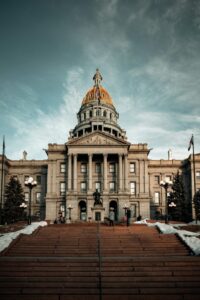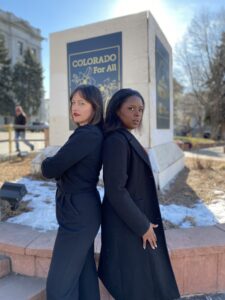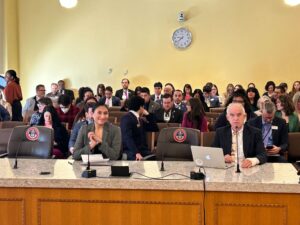
Since we started organizing young people back in 2006, a lot has changed (including the resurrection of cropped pants—but can we please leave gauchos in the past?). Young people think about organizing and political power differently, and they think about the issues differently, too. Young people know that making sure abortion care is affordable and accessible is connected to a person’s financial present and future.
That’s why we created the Youth Agenda. The Youth Agenda is more than the shortlist of young people’s top priorities: it’s the benchmark by which we measure our fights—and our wins—against. From Jan. 10 through May 8, our team walked the hallowed halls of the state Capitol to fight for young people’s political priorities. Our focus in 2024? Economic justice, specifically renters’ rights and housing affordability.
What is the legislative session?

It’s when the Colorado General Assembly, which includes all 35 members of the Senate and all 65 members of the House of Representatives, meets for 120 days from January to May of each year to pass bills and ultimately implement laws. 2024 marks the seventy-fourth legislative session. See what went down at leg.colorado.gov.
But wait… How does it work?
It’s probably been a while since your Schoolhouse Rock Days. So, let’s break down how a bill becomes a law in the state of Colorado and how New Era and the young people we represent are involved in it.
- It starts with a problem and an idea for how to solve it. Think about something that has impacted you (student loan debt? High Rent?). Now, think about a way you want to solve it. Policy ideas can come from many places–our state leaders, nonprofits, grassroots activists, or YOU—and then people spend time testing, tweaking, and working to turn the idea into a viable political possibility.
- A state legislator turns that idea into a bill. At the state legislature, you need a sponsor from either the Senate or House of Representatives to introduce a bill. The rules dictate that each legislator can sponsor five bills per legislative session. Sometimes, advocates will ask a specific legislator to run a bill if the senator or representative has experience in the advocate’s policy area. The bill has to make it through both chambers so party leadership (legislators who are elected by fellow members of their party into positions of power at the Capitol) will help advocates decide who should sponsor and cosponsor each bill. Legislators, policy experts, and stakeholders work with billwriters at the Capitol to turn the idea into a physical piece of legislation.
- The bill gets introduced. The bill will be introduced in either the House or the Senate. This is where legislators who are sponsoring the bill will explain what the bill does and why it is important. Additionally, this can be a moment for a bit of fanfare, like a press conference, to get the bill on decision-makers’—including constituents’—radars.
- Committee time. Once a bill is introduced, it will be assigned to a committee that specializes in the bill’s subject area. For example, if you are introducing a bill about the environment, your bill would go to the Agriculture, Water & Natural Resources Committee. Committee hearings are where community members, lobbyists, and organizations can testify in support or opposition to a bill. Legislators on the committee can also propose, pass, or reject amendments to a bill after hearing concerns from constituents and stakeholders. See which are being debated at the legislature this year!
- If the bill has a fiscal note (where state money will be spent or impacted by this potential policy), it will go through the Appropriations Committee.
- Second Reading. After a bill passes out of committee, it’s read again on the floor of the chamber where it was introduced. The bill is reintroduced on the floor in case it has any new amendments from the committee that need to be debated. This is an opportunity for the whole legislative body to add any other amendments and debate the bill again.
- Third reading. This is where all legislators in the chamber will debate the bill one more time in its entirety to go over any amendments and to decide if it should move forward to the other chamber.
- To the other chamber! Time to do the process all over again in the second chamber! This also includes going through committee hearings and final reading on the floor if/when the bill passes out of committee.
- To the Governor’s Desk. Once a bill passes out of both chambers, it heads to the Governor’s desk. The Governor has 10 days to act on the bills sent to them. Additionally, the Governor doesn’t have to sign every bill that comes their way, though; the Governor could let a bill become law without signing it or decide to veto the bill, preventing it from becoming law.
- If the legislature is still in session, the General Assembly can override the Governor’s veto if both chambers repass the bill with a two-thirds majority vote from each chamber.

How and where can young people tap in?
At New Era, we believe that impactful policies come from or are made in consultation with the community. That’s how we ended up passing SB23-190 to regulate anti-abortion centers’ deceptive practices: We heard about their impact for years from CU Boulder students. One way we work to ensure that a bill centers the community’s perspectives is to organize year-round and base our work on the Youth Agenda.

At different stages, involvement can look different.
- Testify. When a bill is going through a committee, young people can submit testimony–written, virtual, or in person–that shares their perspective or experience related to the bill’s issue. Our Organizing team helps recruit, and our Political Department helps train and support storytellers who testify at the Capitol. If you testify, know that you won’t be alone, and New Era will have your back.
- Take Action. It’s important that our legislators know how many young people in Colorado are in support of policies that help make rent more affordable or that protect a person’s right to an abortion. So when you see an action alert from us in your inbox or on socials, take two minutes to learn about the bill and take action!
What is New Era working on?
During the 2024 legislative session, our biggest policy priority was economic justice, specifically policies that assert renter protections and make housing options more affordable for young people across the state. While we engaged with almost 40 bills, our top bills were:
- HB24-1098 For Cause Evictions | At the start of the 2024 legislative session, there were no legal protections for renters when it comes to evictions. As rents rise, more and more young people can’t afford to stay where their lives are, and evictions can be devastating for your financial present and future. We’re proud to be a part of the Colorado Homes for All Coalition that advocated in support of and ultimately passed this bill led by sponsors Rep. Javier Mabrey, Rep. Monica Duran, Sen. Julie Gonzales, and Sen. Nick Hinrichsen.
- HB24-1007 Residential Occupancy Limits | In communities across Colorado, there are laws that limit the number of unrelated people who can legally live together, stopping young people from saving money on rent and living with their chosen families. This bill now prevents cities from passing discriminatory occupancy limit policies and ensures that housing policies are centered in health, safety, and welfare. We’re proud to support this bill passage, which was led by Rep. Manny Rutinel, Rep. Javier Maybrey, Sen. Tony Exum, and Sen. Julie Gonzales.
We also kept a close eye on bills that undermined young people’s political priorities, like a state income tax reduction that would decrease state investment in public goods or restricted a person’s legally protected right to an abortion regardless of what insurance a person has.
We’re proud to say that the 2024 legislative session was a successful one at New Era where we busted our butts to make Colorado a more affordable home for young people.

What Can I Do?
Reach out to us! We are always looking for young storytellers to shape how we tell the story of young people’s political progress in Colorado, especially around abortion rights and economic justice. If you’re interested in sharing your story through testifying or our other work at the Capitol in future legislative sessions, reach out to Senior Organizing Manager Kate Kelly at Kate@NewEraColorado.org!
